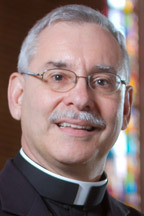
Bishop Anthony B. Taylor delivered this homily during the Red Mass at the Cathedral of St. Andrew in Little Rock Sept. 10.
Every year we celebrate this votive Mass of the Holy Spirit to ask the Holy Spirit to guide judges, attorneys, law school professors, students and public servants in the exercise of your duties in the light of God's higher law, apart from which there is no true justice.
That is why the legal profession is an art requiring insight into the human condition, not an exact science. This requires you to exercise prudence, the most important of the four cardinal virtues -- the others are justice, fortitude and temperance. Cardinal is the Latin word for "hinge" and we call these cardinal virtues because all the other virtues are built on them.
Prudence enables us to discern and achieve the true good in the actual circumstances we face. It is called "the charioteer of the virtues" because it guides us in the exercise of the other virtues.
That is why your profession is called jurisprudence. "Juris" is the law -- and jurisprudence is the prudent application of legal and moral principles to particular cases.
If these moral principles are forgotten, you have legalism, not jurisprudence. Prudence keeps us focused realistically on the good we hope to achieve and the evil we hope to avoid.
In today's Gospel Jesus is challenged by the scribes and Pharisees, two groups of people who usually disagreed with each other because they generally approached the law from opposite directions. The scribes were minimalists. They were experts in finding loopholes in laws that conflicted with their own self-interest. The Pharisees were maximalists. They applied the law very strictly -- indeed the name Pharisee originally meant "the separated ones" because of their strict application of religious law.
Jesus himself was a Pharisee as can be seen by the fact that people called him rabbi. But like us, Jesus holds his own people to a higher standard and so we repeatedly see him trying to develop in his hearers the virtue of prudence: challenging them to move beyond the strict letter of the law to its prudent application in particular cases, in the light of that higher law before which all other laws must give way.
In today's Gospel the issue was Jesus healing a man in clear violation of the religious law prohibiting work on the Sabbath. He challenged his hearers, "I ask you, is it lawful to do good on the Sabbath rather than to do evil, to save life rather than to destroy it?"
Notice: he is making a distinction between "doing good" for others and "doing work" for one's own benefit -- a distinction which in Jesus' time the loophole-seeking scribes had not yet noticed.
"Looking around at them all, he said to the man with the withered hand, "Stretch out your hand." He did so and his hand was restored. But the scribes and Pharisees became enraged and discussed what they might do to Jesus."
If we forget that the purpose of the law is to do good, we have legalism, not jurisprudence. Prudence keeps us focused on the good we hope to achieve.
We need to remind ourselves of this because our legal system is deficient in this area. We've all heard the refrain: "it's the law, it's the law, it's the law" -- most recently on the topic of undocumented immigration -- as if the law of itself were sacred, regardless of its provisions.
We should never forget that segregation was a system of laws, totally legal and totally immoral. And the inhumane internment of Japanese Americans during World War II was totally legal and totally immoral.
Jesus' example in today's Gospel shows us that it is immoral to refuse to help someone in need, even if you have to break a man-made law to do it. The Sabbath was made for man, not man for the Sabbath. Or as Pope John Paul II said, beyond a certain point unjust laws lose their binding force.
Of course, we still might have to pay a heavy price for doing what is right. They didn't crucify Jesus for nothing! They crucified him because he broke human laws that were in conflict with divine law.
It is for an increase of that Holy Spirit's guidance and illumination that we are gathered here to pray today. May God bless you in your exercise of the legal profession, and may he bless us through you in your exercise of true jurisprudence.
Audio files from Bishop Taylor's homilies are regularly posted in English and Spanish on the diocesan website. Listen to them at www.dolr.org/audio/index.php.
Please read our Comments Policy before posting.
Article comments powered by Disqus What the Catholic Church teaches about purpose for work
What the Catholic Church teaches about purpose for work
 Three Catholic High seniors sign to discern priesthood
Three Catholic High seniors sign to discern priesthood
 More pastoral appointments announced
More pastoral appointments announced
 I knew in fifth grade Jesus was my best friend
I knew in fifth grade Jesus was my best friend
 St. Joseph a model of solidarity with immigrants
St. Joseph a model of solidarity with immigrants
 Two gifts after Jesus’ death: Virgin Mary and Eucharist
Two gifts after Jesus’ death: Virgin Mary and Eucharist
 Why we have an altar, and not just a communion table
Why we have an altar, and not just a communion table
 Pope: Wars should be resolved through nonviolence
Pope: Wars should be resolved through nonviolence